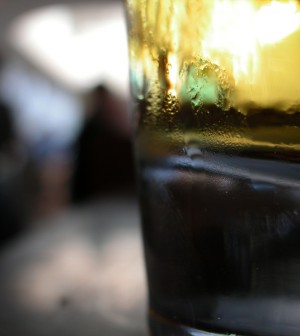- Could Your Grocery Store Meat Be Causing Recurring UTIs?
- Are You Making This Expensive Thermostat Error This Winter?
- Recognizing the Signs of Hypothyroidism
- 10 Strategies to Overcome Insomnia
- Could Artificial Sweeteners Be Aging the Brain Faster?
- Techniques for Soothing Your Nervous System
- Does the Water in Your House Smell Funny? Here’s Why
- Can a Daily Dose of Apple Cider Vinegar Actually Aid Weight Loss?
- 6 Health Beverages That Can Actually Spike Your Blood Sugar
- Treatment Options for Social Anxiety Disorder
Cutting Back on Wine? Try a Smaller Glass

Like wine just a little too much sometimes? You may sip a little less over an evening if it’s served in smaller goblets, a new British study finds.
“It’s not obvious why this should be the case, but one reason may be that larger glasses change our perceptions of the amount of wine, leading us to drink faster and order more,” said lead researcher Rachel Pechey, of the University of Cambridge.
In the study, Pechey’s team tracked customers’ purchases of wine in a restaurant/bar over 16 weeks. Every two weeks the restaurant changed the size of its wine glasses, alternating between the standard 10-ounce size and 12-ounce and 8-ounce sizes.
The amount of wine served each day by the establishment was 9.4 percent higher when it was sold in larger (12 ounce) glasses compared to standard-sized glasses, even though the amount of wine served in the glasses each time remained the same.
There were “inconclusive” findings when the smaller (8 ounce) glasses were substituted for the standard-size glasses, the researchers said.
The bottom line, though, was that “we found that increasing the size of wine glasses, even without increasing the amount of wine, leads people to drink more,” Pechey said in a university news release. She works in Cambridge’s Behavior and Health Research Unit.
The findings suggest “that avoiding the use of larger wine glasses could reduce the amount that people drink,” said study co-author Theresa Marteau, who directs the research unit.
“We need more research to confirm this effect, but if it is the case, then we will need to think how this might be implemented,” Marteau said. “For example, could it be an alcohol licensing requirement that all wine glasses have to be below a certain size?”
The study was published June 6 in the journal BMC Public Health.
More information
The U.S. National Institute on Alcohol Abuse and Alcoholism offers tips for cutting down on drinking.
Source: HealthDay
Copyright © 2026 HealthDay. All rights reserved.










